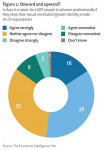Crunch time for democracy?...The financial crisis and the risks for democracy
The crisis threatens to undermine the credibility of free-market capitalism—-it would be wrong to underestimate the anger that the developments on Wall Street have engendered on so-called Main Street. There is talk of a broken financial system discrediting Western values in general. A broader backlash may develop against free markets and neo-liberal ideology in some countries as economic conditions deteriorate. According to Laza Kekic, the Economist Intelligence Unit's Director for Country Forecasting Services, "While it is highly unlikely that developed countries would experience a significant rollback of democracy, there is little cause for complacency, especially about the impact on emerging markets with fragile democratic institutions." A lot will depend on the depth and duration of the economic recession, as well as the extent to which attitudes towards the market and role of government actually shift. There are several ways in which democracy might be adversely affected:
· Economic recession could boost extremist political forces in western Europe, and is also likely to feed anti-immigrant sentiment. These trends will interact with existing concerns about terrorism and could result in a further erosion of civil liberties.
· Many non-consolidated democracies are very fragile and if subject to intense socio-economic stress, backsliding on democracy is possible. The recent halt in democratisation could turn into a retreat.
· The shallowness of democratic cultures—as revealed by disturbingly low scores for many countries in the Economist Intelligence Unit's indexes for political participation and political culture—also underscores the fragility of many democracies and the potential for reversals.
· Serious recessions typically threaten democracy via increased social unrest. It is therefore worrying that 48 countries are assessed by the Economist Intelligence Unit as having a high risk of social unrest.
· The financial and economic crisis may increase the attractiveness of the Chinese model of authoritarian capitalism for many emerging markets.
· Democracy promotion by the Western world was already discredited by the experience in the Middle East over recent years. The economic crisis is likely to further undermine the credibility of efforts by developed nations to promote their values abroad.
While a significant backsliding in democratisation is by no means inevitable, these factors suggest that nations with a weak democratic tradition may be vulnerable to setbacks over the next few years.
Results for 2008
Although almost half of the world's countries can be considered democracies, the number of "full democracies" is relatively low (only 30); 50 are rated as "flawed democracies". Of the remaining 87 states, 51 are authoritarian and 36 are considered to be "hybrid regimes". Half of the world’s population lives in a democracy of some sort, although only some 14% reside in full democracies. More than one third of the world’s population still lives under authoritarian rule.
In most regions the average democracy score for 2008 is similar to the average recorded for 2006. The sole exception was eastern Europe, which had a perceptible decline in its average score. In 19 countries of eastern Europe the democracy score declined between 2006 and 2008; in only one country in this region (the Czech Republic) was there a slight improvement.
In only 12 countries out of the 167 that are covered was there a change in regime type between 2006 and 2008—in eight there was a positive upgrading and in four a regression. Eight of the 12 countries undergoing a change in regime type were in Asia, where many of the most significant changes, in both directions, in democratisation between 2006 and 2008 occurred.
The Nordic states and other West European countries dominate the top ten. By contrast, the US and UK are near the bottom of the full democracy category. In the US there has been an erosion of civil liberties related to the fight against terrorism. Problems in the functioning of government have also become more prominent. In the UK there has also been some erosion of civil liberties, but here the main feature is shockingly low level of political participation.
The Economist Intelligence Unit's Democracy Index 2008 is available free of charge at: www.eiu.com
Notes for editors
The Economist Intelligence Unit’s Democracy Index is based on five categories: electoral process and pluralism; civil liberties; the functioning of government; political participation; and political culture. The index provides a snapshot of the current state of democracy worldwide for 165 independent states and two territories (almost the entire population of the world). The overall index of democracy, on a 0 to 10 scale, is based on the ratings for 60 indicators grouped in the five categories. The overall index is the simple average of the five category indexes. A three-point scoring system for the 60 indicators is used. The category indexes are based on the sum of the indicator scores in the category, converted to a 0 to 10 scale. Countries are placed within one of four types of regimes: full democracies (scores of 8-10); flawed democracies--score of 6 to 7.9; hybrid regimes--scores of 4 to 5.9; authoritarian regimes--scores below 4.
About the Economist Intelligence Unit
The Economist Intelligence Unit is the world leader in global business intelligence. It is the business–to–business arm of The Economist Group, which publishes The Economist newspaper. As the world's leading provider of country intelligence, the Economist Intelligence Unit helps executives make better business decisions by providing timely, reliable and impartial analysis on worldwide market trends and business strategies. More information about the Economist Intelligence Unit can be found at www.eiu.com.
웹사이트: http://www.eiu.com
연락처
Joanne McKenna
Press Liaison
Economist Intelligence Unit
26 Red Lion Square
London
WC1R 4HQ
UK
Direct: +44 (0) 20 7576 8188
Sales: +44 (0) 20 7576 8181
Switchboard: +44 (0) 20 7576 8000
email: 이메일 보내기
이 보도자료는 Economist Intelligence Unit가(이) 작성해 뉴스와이어 서비스를 통해 배포한 뉴스입니다.




